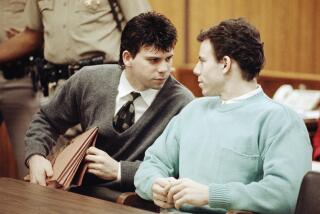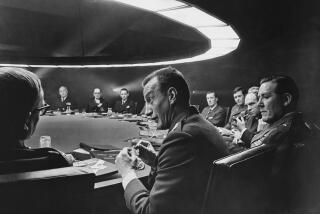Review: ‘1971’ recalls burglary that birthed America’s ‘big brother’
“1971” is an appropriately matter-of-fact title for a decidedly low-key documentary. But don’t mistake a lack of flash for an absence of substance. The story told here couldn’t be more significant or more timely.
As directed by Johanna Hamilton (who co-produced the excellent “Pray the Devil Back to Hell”), “1971” tells all about a half-forgotten clandestine event that took place on the night of March 8 of that year, an incident that had a more enduring impact than even its participants anticipated.
While much of America was watching the long-awaited heavyweight championship fight between Muhammad Ali and Joe Frazier, a group of men and women broke into an FBI office in Media, Penn., a small town near Philadelphia, and walked out with every file in the place, more than 1,000 documents all told.
This group, which called itself the Citizens’ Commission to Investigate the FBI, did more than take the documents, they sent the most incriminating to members of Congress and key media outlets. Only the Washington Post allowed its reporter, Betty Medsger, to publish the contents of what was unabashedly stolen material, and the results were incendiary.
For what those Media documents revealed was the first proof of the extent of government snooping on, and intimidation of, ordinary citizens, revelations that led to the first congressional investigation of intelligence organizations.
More than that, those documents led, a year later, to a Freedom of Information search initiated by NBC News’ Carl Stern that revealed how the bureau threatened and coerced activists like Martin Luther King Jr. through a shocking program called COINTELPRO.
The burglary not surprisingly infuriated FBI Director J. Edgar Hoover, but though 150 agents flooded the Philadelphia area, the eight individuals responsible were never apprehended and never publicly identified until Medsger’s book on the subject came out last year.
Hamilton’s film, which uses Medsger as an interview subject, makes extensive use of adequate if uninspired re-creations to show us what the burglary looked like. But the real reason to see it is the interviews with the perpetrators.
Five of the eight agreed to talk on camera, and they are to a person thoughtful and articulate, a portrait of what idealism in action looks and feels like as well as an examination of some of the unanticipated consequences those kinds of actions engendered. These political activists were convinced that the FBI was up to no good and were determined to find proof by any means necessary.
Introduced while picking the same kind of lock he opened back in 1971 is Keith Forsyth, who nonchalantly comments, “It’s not hard to do, it’s a mechanical skill like anything else.” Looking back on his younger self, he says “I remember being anxious, angry, frustrated, all the feelings that went along with the time. ... I was done talking, I was ready to be confrontational.”
The man who came up with the idea of the FBI office raid was Bill Davidon, a professor of physics at Haverford College who’d read about a similar, unsuccessful burglary in Rochester, N.Y. Davidon’s failing health (he died in 2013) and a desire to give him credit was one reason the group has gone public.
Determining that secrecy and reliability were key elements, Davidon recruited people he knew personally from the anti-war movement. Key to the group were Bonnie and John Raines, married and the parents of three young children, which made things more complicated for them. John had been radicalized by being on the second Freedom Ride and felt that “unjust power must be seen, confronted, resisted,” while his wife, equally passionate, felt somewhat marginalized by her status as a woman in the group.
Bonnie Raines turned out to be key to the burglary’s meticulous planning, because she cased the office in question by disguising herself as a Swarthmore College student looking for information on FBI job possibilities.
Though it does not go into nearly as much detail as Medsger’s nearly 600-page book, “1971” does lay out the myriad twists and turns of both the burglary and its aftermath.
One of the film’s most interesting aspects is how the participants feel about it today. Bob Williamson worries about having contributed to raising the level of public cynicism about government. John Raines, however, allows for no regrets, not even in the face of his children’s shock that he was willing to have them raised by another relative if he and his wife were caught.
“Just because we were parents didn’t absolve us of responsibility,” Raines says. “If all of us did only what was safe, no one would be safe.”
------------------------
‘1971’
No MPAA rating.
Running time: 1 hour, 20 minutes.
Playing Laemmle’s Music Hall, Beverly Hills
More to Read
Only good movies
Get the Indie Focus newsletter, Mark Olsen's weekly guide to the world of cinema.
You may occasionally receive promotional content from the Los Angeles Times.







